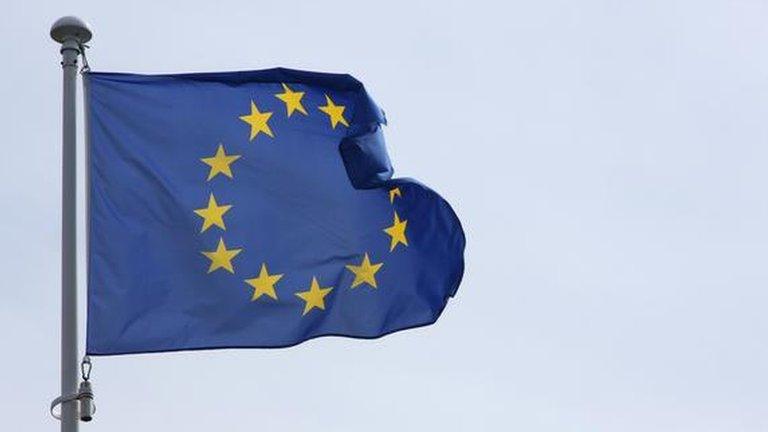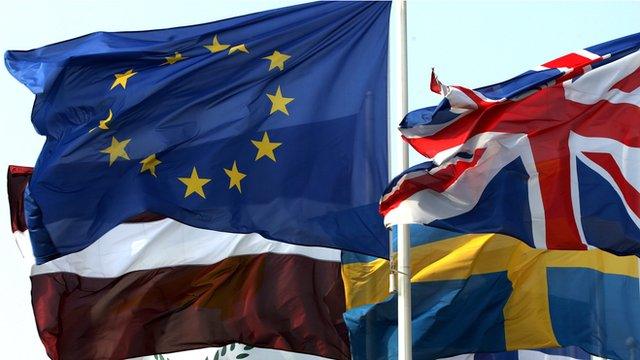Cameron's hardest speech
- Published
- comments
Europe: Conservative group demands return of powers to UK
On Friday, David Cameron will make one of the most difficult speeches of his premiership.
He and his advisers have been working on it for months. Delivery dates have come and gone. In trying to set out how he sees Britain's place in a changing Europe, he will inevitably disappoint.
Some will question why a vote cannot be held this side of an election. Others will accuse of him of leaving Britain's future in Europe open to question - and that could unsettle potential investors in the UK. Some will say that Britain faces years of argument and debate before the issue is settled.
What is undeniable is that Europe is changing profoundly. Not by choice but by necessity. If the eurozone is to survive there will have to be much tighter integration. German Chancellor Angela Merkel has spoken of moving towards a political union.
That, in itself, is one reason why this will be a slow-burning debate. Nothing will happen quickly. The government believes there is no point in consulting the British people until it is clear how Europe will develop. And that could take years.
Natural allies
The prime minister's plan depends on him being re-elected in 2015. It then depends on events in Europe. Sometime after the German election in September, Chancellor Merkel has indicated she may push for a change to the treaties in order to correct some of the basic flaws in the euro.
A treaty change will enable Mr Cameron to demand something in return for British agreement. Treaty change is rarely swift, however. Negotiations over the Lisbon Treaty lasted eight years. It would not take so long with a treaty change - but we could be talking about 2018 or later before the British people have their say.
The negotiations will be complex. There is little appetite in Europe for making major concessions to the UK. I am in Germany at the moment. The Germans want Britain in the EU. That is not in doubt. They see the UK as an ally over free trade and open markets.
They also see Britain as a counter- balance to France and the southern European countries. German support will not come at any price, however. Angela Merkel believes her legacy is tied to saving the euro, and will not allow Britain to put obstacles in the way.
The Germans would prefer to avoid any debate about opt-outs and returning powers to Westminster. What Berlin is prepared to do is to join London in reducing regulation and revisiting what can best be left to a national parliaments rather than decided at a European level.
This is where David Cameron would have little room for manoeuvre. Many in the Conservative party would not be satisfied with just less regulation. They want opt-outs from policing and criminal justice and some employment laws. (David Cameron is unlikely to present a shopping list of demands on Friday.)
A review on what "competences" would be up for negotiation will not be completed until 2014.
New deal
Many Conservative back-benchers will only settle for powers being repatriated. Some in the government believe that the very word "repatriate" puts up backs in Europe. The Deputy Prime Minister, Nick Clegg, has suggested a "rebalancing" of powers. Potentially, the UK has a lot of allies when it discusses what can best be done at a national level, or what can make Europe work better and be less intrusive or bureaucratic. But "repatriating" powers will involve a fight with countries like France.
Joaquin Almunia, an EU Commissioner, says that renegotiating terms of membership would be "extremely difficult".
The government will also have to manage expectations. There will be no point in consulting the British people if there is just a change, say, to the working time directive. The whole exercise will not have been worth the effort. In order to justify seeking the consent of the British people, there will have to be a new deal, with the relationship with Europe put on a new footing.
The prime minister has spoken of voters being given a "real choice". That may not, of course, be through a referendum.
If there is a referendum - whatever the question - it will be regarded as an "in-or-out" vote, and there are many senior people in Europe who would want it that way. Among some leaders, there is a real desire to end the uncertainty with Britain once and for all.
So if there is to be a "fresh settlement" of Britain's role in Europe, it will not come quickly or easily.
- Published6 January 2013

- Published24 September 2015
- Published22 November 2012
